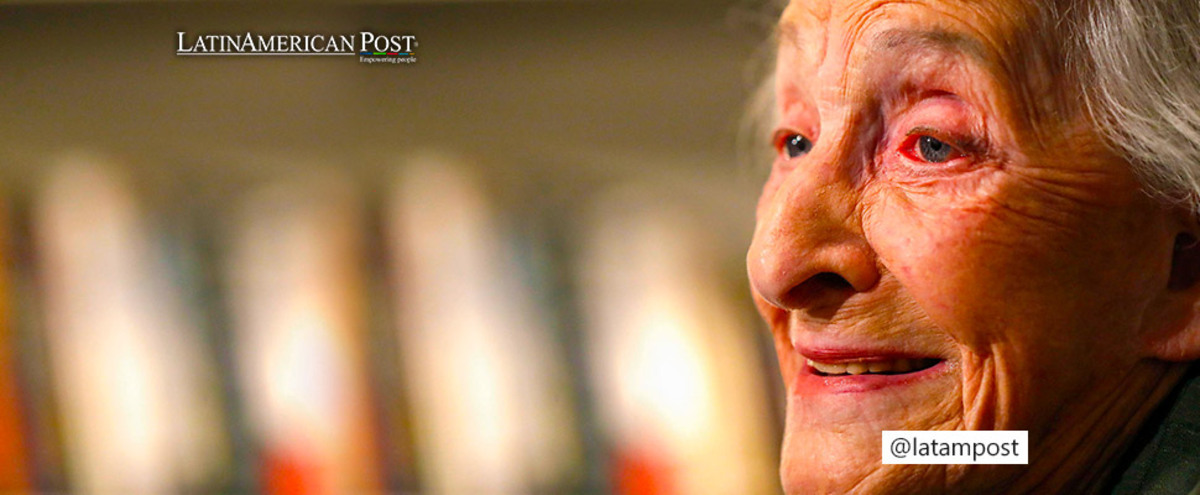Interview With Ida Vitale: “100 Years Don’t Weigh Me Down”
Ida Vitale will soon turn 100 years old, which "does not weigh on her." EFE interviewed the Uruguayan writer .

Photo: EFE/ J.P. Slacker
Alida Juliani | EFE
Listen to this article
Leer en español: Entrevista a Ida Vitale: “No me pesan los 100 años”
On November 2, the Uruguayan poet Ida Vitale will turn 100 years old, a figure that does not weigh on her, "why should I do it?" she asks in an interview with EFE in Madrid, "one forgets bad things, the first thing what one should do is forget the bad things", and "in what life are there not bad things?"
Close to celebrating a century of life, Vitale returns to Madrid to present the reissue of one of his most successful books: "Where the chameleon flies" (Lumen publishing house), originally published in 1996 and unpublished in Spain until now, a work half I walk between poetry and prose that brings together stories, fables and allegories.
Interviewing Vitale is not easy due to the large number of questions that journalists have asked her in her life, but she answers, laughing, that in her native Montevideo they don't do it: "They don't need interviews there, the Montevideans know everything, the Uruguayan is enough, it is enough, but no, they are good people," he points out to remember that many people have gone to live in Uruguay, especially Spaniards.
The Uruguayan writer quickly remembers the Spanish writer José Bergamín, of whom she was a very good friend: "at least we disciples loved him very much and that must be satisfactory for someone who has had to leave his country, right? and even more so from Spain which at that moment was horrible."
She was also exiled – she lived for 10 years in Mexico with her second husband Enrique Fierro after the 1973 coup d'état in Uruguay – but she never felt that way: "One says exiled and it seems that creates an aura of suffering. No, I was very happy everywhere. In Mexico there were great people. In reality it was a promotion to go to Mexico. Only with Octavio Paz they have more than enough for us." Almost a hundred years "at least."
"I wouldn't change anything I've written, maybe do something else. Whatever I write is better, but what happened, happened," says Vitale, looking back on his literary production, of which she says she has no topics left to write.
"I never thought that I had an obligation to do one thing or another, what came out, came out. When you write it is spontaneous, then you have to correct it, that's basic," she explains.
Regarding what she has already written, "I think it could always have been better, but hey, I could have also come to a world better made," she says again to laughter.
Read also: "Like Water for Chocolate", New HBO Series Based on the Novel by Laura Esquivel
She liked returning to his country after passing through Mexico and the United States, but "the people I wanted to see are no longer there. The problem with being 100 years old is that not all of them arrived, I miss a lot of people, but anyway. The whole thing people I loved and died, but well that happens to all of us, we have to accept it," she says with nostalgia in his eyes.
And despite her old age, Vitale does not think about death, well yes, "sometimes when I fix a drawer I think so that it is in order," he laughs, but for example the impressive library that he accumulated throughout his life, she assures that "I don't want to wear it."
The important thing about that library is not how many copies it keeps, but how many it lost. "From one country to another, sometimes you think you're going to come back and you don't come back. What's left has to stay here and now," she says resignedly.
Young people who do not read
For Vitale, the fault that young people do not read lies "with those who write and with the teachers": "At home there were books in the library, perhaps the fault lies with the parents. The normal thing is that one appropriates everything one there is in the house starting with the books".
She remembers her teachers with great affection, especially the Italian teacher, "I had excellent teachers in everything, even mathematics," a subject that she liked "but it was something foreign."
But returning to the young people of today, Vitale recommends that they "not read, to see if out of a pure spirit of opposition they read," she says, opening her eyes, and remembers that novels fascinated her because they told her things that did not exist in his real life.
So many years seeing how they define her personally and literary and Vitale summarizes her life in "I am a sweet lover", due to her passion for sweets since she was a child, increased by a food, "el puchero", which was recurrent in her house.
"And I still have to learn to play the piano," says Vitale with that desire for everything close to 100 years old.




